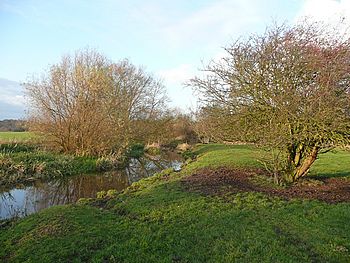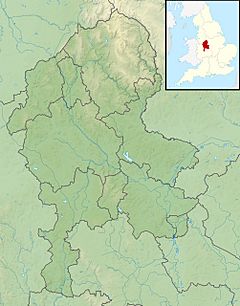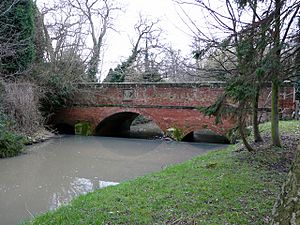River Swarbourn facts for kids
Quick facts for kids River Swarbourn |
|
|---|---|
 |
|
| Country | England |
| Counties | Staffordshire |
| Physical characteristics | |
| Main source | Marchington Woodlands |
| River mouth | Between Wychnor Park and Alrewas 52°44′29″N 1°45′33″W / 52.74133°N 1.75906°W |
| Length | 16 km (9.9 mi) |
| Basin features | |
| Basin size | 48 km2 (19 sq mi) |
| Tributaries |
|
| Progression : Swarbourn—Trent—Humber | |
The River Swarbourn is a small river in Staffordshire, England. It flows for about 16 km (9.9 mi) (10 miles) and is a branch of the larger River Trent.
Contents
Where is the River Swarbourn?
The River Swarbourn flows through a part of Staffordshire known as Needwood Forest. It collects water from an area of about 48 square kilometres (19 sq mi). This area is located between two other rivers: the River Blithe to the west and the River Dove to the north.
The Journey of the Swarbourn
The river starts near the village of Marchington Woodlands. From there, it flows towards the southeast. Along its path, it passes through several places, including:
- Newborough
- Hoar Cross
- Woodmill
- Yoxall
Finally, the River Swarbourn joins the River Trent. This meeting point is located between Wychnor Park and Alrewas.
Walking Along the River
There is a long-distance walking path in Staffordshire called the Way for the Millennium. This path follows the Swarbourn river. You can walk along the river from Yoxall all the way to where it meets the Trent.
River Health and Wildlife
The Swarbourn river is important for local wildlife. Experts check its health using something called the Water Framework Directive. The river's health is currently rated as "moderate." This means it's doing okay, but there's always room for improvement to make it even better for the plants and animals that live there.
Special Crayfish in the River
The River Swarbourn is home to a special type of animal called the White clawed crayfish. These crayfish are native to the UK, but they are also an endangered species. This means they are rare and need protection. They live mainly in the upper parts of the river.
In 2013, a problem called Crayfish plague was found in the lower parts of the river. This plague is a fungal disease that is carried by a different type of crayfish, the American signal crayfish. The disease is very dangerous for the native white-clawed crayfish. People are working hard to stop the plague from spreading. The goal is to protect the native crayfish in the river and in nearby ponds.
New Homes for Otters
Between Yoxall and Wychnor, a special wetland area has been created. It used to be a forest of conifer trees, but these were cut down to make a wet meadow. This new area is called Swarbourn Meadow.
In this wetland, people have built an artificial "holt." A holt is a special den or home for otters. Otters have been seen in the nearby River Trent, so the hope is that they will come to Swarbourn Meadow and use this new home. This helps to support the otter population in the area.



